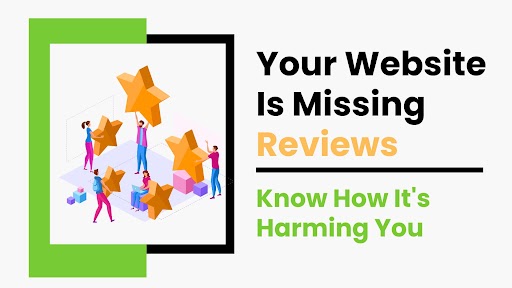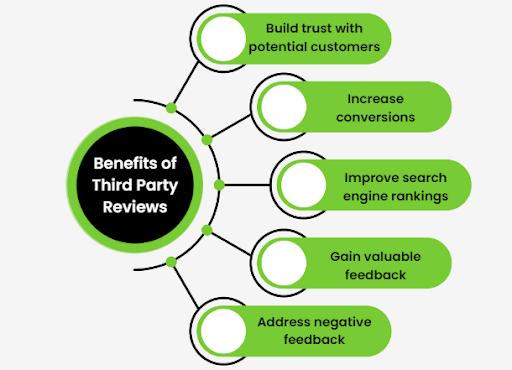Your Website Is Missing Reviews – Know How It’s Harming You

Often we easily consider things to buy which have reviews because feedback builds trust for us! True?
This is how websites with reviews make their credits. Because a great review is great and a bad one is bad.
It is enormously cheering to get a good review by someone who seems to understand your work.
Kenneth Koch
A review is not just an acknowledgement for a brand, it also strengthens belief in the visitors of the website.
Let us read further to find out how the performance of a website with missing reviews matter.
Relevance of Reviews on Website
As more and more businesses shift online, the importance of online reviews is becoming increasingly evident. Online reviews provide social proof of the quality of your products or services and can make or break a customer’s decision to purchase from you.
If your website needs to include reviews, you’re missing out on an opportunity to showcase your business’s credibility and trustworthiness.
Search engines consider the authority of the website and the probability of displaying the result on top increases. Without thought, potential customers may be hesitant to trust your brand and choose to take their business elsewhere.
Benefits of Third Party Reviews
There are numerous benefits to having reviews on your website, including the following:

1. Build trust with potential customers:
Reviews provide social proof of the quality of your products or services, which can help to build trust with potential customers. When they see that others have had positive experiences with your business, they’re more likely to trust that they’ll have a good experience too.
2. Increase conversions:
Positive reviews can also help to increase conversions. When customers see that others have had a good experience with your business, they’re more likely to purchase or take other desired actions.
3. Improve search engine rankings:
Search engines like Google consider the quantity and quality of reviews when determining the relevance and authority of a website. Having many positive thoughts can help boost your search engine rankings and make it easier for potential customers to find your website.
4. Gain valuable feedback:
Reviews can also provide valuable feedback that can help you improve your products or services. By paying attention to what customers are saying, you can identify areas where you need to make improvements and make changes that will help better meet your customers’ needs.
5. Address negative feedback:
While negative reviews may not seem beneficial, they provide an opportunity to address customer concerns and show that you’re committed to providing good customer service.
By responding to negative feedback constructively, you can turn a negative experience into a positive one and show that you care about your customers’ satisfaction.
What Happens If Your Website Misses Third Party Reviews?
If your website is missing reviews, it can harm your business in several ways:
1. Lack of social proof
Reviews provide social evidence of the quality of your products or services. Without reviews, potential customers may be hesitant to trust your brand and choose to take their business elsewhere.
2. Decreased conversions
Positive reviews can help to increase conversions. Potential customers may be less likely to purchase or take other desired actions without reviews.
3. Decreased search engine rankings
Search engines like Google consider the quantity and quality of reviews when determining the relevance and authority of a website. Without reviews, your website may not rank as highly in search engine results, making it harder for potential customers to find you.
4. Missed opportunities for feedback
Reviews can provide valuable feedback that can help you improve your products or services. With reviews, you may get important insights that could help you make your business better.
5. Missed opportunities to address negative feedback
Negative reviews provide an opportunity to address customer concerns and show that you’re committed to providing good customer service. With reviews, you may take advantage of the chance to turn a negative experience into a positive one.
How Can You Get Reviews On Your Website?
Getting reviews on your website can be challenging, but there are several things you can do to encourage customers to leave reviews. 84% of consumers trust reviews as personal recommendations from family and friends. Reports say that 91% online shoppers read them.
Reviews help businesses understand their customers better and help them improve their services.
Let us read how you can get reviews on your website?

1. Make it easy
Make sure it’s easy for customers to leave a review by including links or buttons that lead them directly to the review page. Avoid making the process complicated or time-consuming.
2. Ask for reviews
Encourage customers to leave a review by asking for feedback. You can send follow-up emails after a purchase or use social media to request reviews. Asking for reviews is essential to building your online reputation and improving your business. However, it can be challenging to learn how to ask for reviews in an effective way that doesn’t come across as pushy. Here are some tips for asking for reviews:
- Timing is key: Ask for a review at the right time when the customer is most likely to be satisfied with their experience. This could be after they’ve made a purchase, received a service, or had a positive interaction with your business.
- Be polite: When asking for a review, be courteous and respectful. Don’t pressure or guilt customers into leaving a review, as this can backfire and result in negative feedback.
- Be specific: Give customers particular instructions on how to leave a review. Provide a direct link to your review page or instructions on how to leave a review on third-party sites like Yelp or Google My Business.
- Make it easy: Make leaving a review as easy as possible. Provide clear instructions, and avoid making the process complicated or time-consuming.
- Personalise the request: Personalise the demand for a review by referencing the customer’s name and their specific purchase or interaction with your business. This shows that you value their feedback and appreciate their business.
- Offer an incentive: Consider offering a small incentive for leaving a review, such as a discount on their next purchase or entry into a contest. This can encourage customers to leave a review and show that you value their feedback.
3. Offer incentives
Consider offering a small incentive for leaving a review, such as a discount on their next purchase or entry into a contest. Offering incentives for reviews can be an effective way to encourage customers to leave feedback and improve your online reputation. Here are some ways that offering incentives can help:
- Encourages feedback: An incentive can encourage customers to leave a review, even if they might not have otherwise. This helps increase the quantity of reviews, which is important for establishing a strong online reputation.
- Increases the quality of reviews: Incentives can encourage customers to leave more detailed, thoughtful reviews, which can be more helpful for potential customers. This can help to increase the quality of your reviews, which can be necessary for establishing trust.
- Boosts customer loyalty: Offering an incentive shows customers that you value their feedback and appreciate their business. This can build customer loyalty and encourage repeat business.
- Provides value to customers: Offering an incentive can provide value, such as a discount or entry into a contest. This can help build a positive relationship with customers and encourage them to share their positive experiences.
- Helps to stand out: Offering an incentive can help your business stand out from the competition. Customers may be more likely to choose your business over others if they know they have the opportunity to receive a discount or other reward for leaving a review.
4. Respond to reviews
Respond to all reviews, both positive and negative. This shows that you value feedback and care about customer satisfaction. Responding to reviews is important for several reasons:
- Building Trust: When you respond to a review, it shows that you value your customer’s opinions and are willing to address any concerns or issues they may have. This can build trust with your customers and encourage them to continue doing business with you.
- Reputation Management: Responding to positive and negative reviews can help you manage your online reputation. It shows that you are engaged with your customers and care about their experiences.
- Customer Feedback: Reviews can provide valuable feedback on your business, products, and services. Responding to positive or negative reviews allows you to better understand your customers’ needs and preferences.
- Marketing Opportunity: Responding to positive reviews can be a marketing opportunity as it shows potential customers that others highly regard your business. Additionally, responding to negative reviews demonstrates your commitment to customer satisfaction and highlights your steps to address issues.
5. Showcase reviews
Once you have reviews, showcase them prominently on your website. This helps to build trust with potential customers and can encourage more reviews. Showcasing reviews is important because:
- It helps build credibility and trust with potential customers.
- Positive reviews can be social proof to encourage people to buy from your business.
- Reviews can provide valuable feedback that can help you improve your products or services.
- Displaying reviews can help differentiate your business from competitors and attract more customers.
6. Use third-party review sites:
In addition to having reviews on your own website, consider using third-party review sites like Yelp, Google My Business, or TripAdvisor. These sites have a large user base and can help increase your business’s visibility.
Conclusion
Online reviews play a crucial role in shaping a business’s reputation. Customers often rely on online reviews to make purchase decisions, and businesses that don’t have reviews or have primarily negative reviews can suffer.
If a website needs reviews, it can harm the business in several ways. Without review, the website appears untrustworthy or suspicious to potential customers. Without reviews, customers may wonder if the business is new or hiding negative feedback.
A lack of reviews means missed opportunities to showcase positive feedback and build customer trust. Having website reviews can also help a website’s SEO efforts.
Search engines like Google use reviews as a ranking factor when determining the relevance and credibility of a website. As a result, websites with no or few reviews may rank lower in search engine results, making it harder for potential customers to find the business.
Reviews on a website are essential for building customer trust, attracting new business, and improving search engine rankings. Conversely, a business that needs to gather and display reviews is missing out on valuable opportunities to establish and grow its online presence.
We can help you get reviews from your valuable customers. For more information contact us or you can write to us hello[at]noboruworld.com.





We would love to have your opinion.